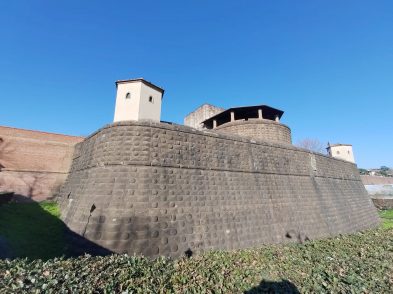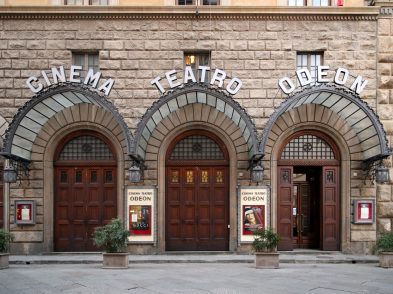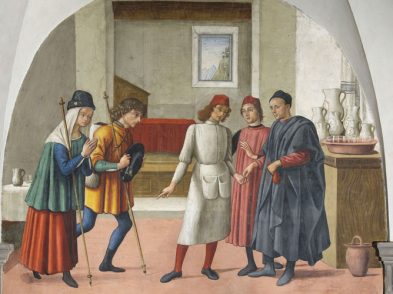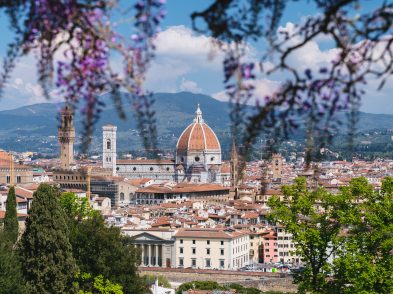Mathematician, philosopher and theologian, Elena Cornaro Piscopia was the first woman ever to be awarded a university degree. It was conferred on her at the University of Padua on June 25, 1678, but her story was rediscovered only a century or so ago. Although famous during her lifetime, not only for her extraordinary intellectual prowess but also for her charitable work with the destitute and needy, her fame gradually faded after her death in 1684. However, in keeping with her wishes, she had been buried as an oblate, or lay nun, in a small chapel in Padua’s Basilica of Santa Giustina rather than in the magnificent tomb her wealthy father had prepared for her.
It was there, in 1895, that Abbess Mathilda Pynsent of the English Benedictine Nuns in Rome came across her broken and neglected gravestone. Learning of her achievements, the abbess had her tomb opened and her remains put into a new, more elaborate casket bearing a tablet inscribed to her memory. The publicity this generated led her alma mater to erect a statue in her memory inside Palazzo Bò at the university.
In turn, in 1906, what is now known as the Cornaro stained-glass window was installed in the west wing of the Thomas Library at Vassar College, in Poughkeepsie, New York, as an inspiration for other young women. Designed by Dunstan Powell, it depicts Elena Cornaro Piscopia wearing a dress in the original rose and grey colours of the college, with the lights in the tracery representing grammar, dialectics, music, philosophy, astronomy, medicine, geometry and theology—all areas of learning she excelled in. She is also featured in a mural on the back wall of the Italian Room at the University of Pittsburgh.
During the seventeenth century, education was a closed world for the majority of women and, for that matter, for many men, unless they were of the privileged classes. Elena Cornaro Piscopia was therefore fortunate to be born in Venice on June 5, 1646, into a very old and distinguished noble family dating back to Roman times. She was even more fortunate because her father, Gianbattista Cornaro Piscopia, who was procurator of San Marco, a position second only to that of the Doge of Venice, was not only ever mindful of his family’s prestige and ambitious for his children, but also enlightened enough to ensure that his daughter was educated along with her brothers.
The best tutors were employed to teach Elena philosophy and theology, grammar, the sciences and languages. Her linguistic skills were such that, at an early age, she already spoke Latin, Greek, Hebrew, Spanish, French, Arabic and Chaldaic, earning her the title of Oraculum Septilingue (a master of seven languages besides one’s native tongue). She was also taught to sing, read and write music as well as to play the harpsichord, clavichord, harp and violin—all more ‘feminine’ pursuits.
Devoutly religious, at 11 years old, Elena took a lifelong vow of chastity. Much to her father’s fury, this compelled her to turn down frequent marriage proposals, including one by a German prince. When her father refused to allow her to join the Benedictine Order of Nuns, she became an oblate in 1665, always wearing the order’s habit beneath her exquisite gowns. Intransigent, her father decreed that, rather than become a nun, his gifted daughter should attend university, something unheard of then. In 1672, he bought a house for her near the University of Padua, where her studies in theology began.
People from all over Europe soon heard about Elena Cornaro Piscopia and came to watch her debate with other scholars. One such debate—in Latin and Greek—was held in 1677 in front of the entire university as well as a large part of the Senate of Venice. Her outstanding performance during the discussion is thought to have influenced the university to grant her a degree. So, on that June day in 1678, the College of Philosophers and Physicians, together with a large audience, gathered at the University of Padua to witness a unique event. The crowd was so great that the examination had to be moved from the university to the cathedral. Barred by authorities in the Roman Catholic Church from receiving a doctorate in theology because of her sex, she was instead awarded a doctorate in philosophy.
After graduation, Elena Cornaro Piscopia spent the rest of her short life studying philosophy, theology and music. In 1678, she also became an instructor in mathematics at the University of Padua, unprecedented in the academic world. A member of many academies, she exchanged correspondence with eminent intellectuals in Italy and abroad.
Yet she never stopped ministering to the sick and poor. She was so renowned for her charitable work that, on July 26, 1684, as news of her death from tuberculosis spread throughout Padua and Venice, people ran through the streets proclaiming that a ‘saint’ had died. Saint or no, the path Elena Cornaro Piscopia undoubtedly opened up for women to exercise their right to higher education is now sacrosanct.








